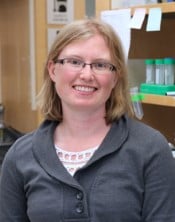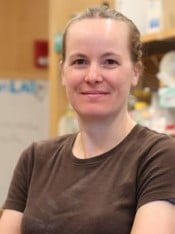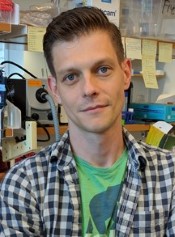Three UMass Medical School postdoctoral research associates have been recognized with 2017 American Cancer Society Fellowships, supporting their research into breast cancer, RNA and innate immunity.
 |
|
|
Caitlin Brown, PhD |
Caitlin Brown, PhD; Amanda Monahan, PhD; and Gregoriy A. Dokshin, PhD, each received extramural grants from the American Cancer Society and expressed appreciation for the support.
Dr. Brown’s research will focus on late-stage breast cancer.
“While treatment for early stage cancer is very good, it is still difficult for patients with later-stage disease. I hope that my research will contribute to improving patient outcomes,” she said.
Brown, who works in the lab of Arthur Mercurio, PhD, professor of molecular, cell & cancer biology, and who will receive $112,000 over two years to support her research, will investigate how a specific cell-adhesion receptor, which has been implicated in breast cancer progression, protects against a novel form of cell death. The results obtained from the studies have the potential to increase the understanding of the novel form of cell death and breast cancer progression, as well as reveal new mechanisms for therapeutic intervention, she said.
“A major step in the process of a cancer cell forming metastatic tumors is the cell gaining the ability to survive in the bloodstream while it travels to a new site. This involves loss of contact with the extracellular matrix, a key mediator of prosurvival signaling and its loss is typically fatal to normal cells,” Brown said.
 |
|
|
Amanda Monahan, PhD |
Dr. Monahan, who works in the lab of Neal S. Silverman, PhD, professor of medicine, has received a $163,500 over three years to study the immune response that occurs inside the cell, which is of particular interest in many inflammatory diseases, including inflammatory bowel diseases and cancers of the gastrointestinal tract.
Monahan said she will try to understand why flies and mice are unable to fend off certain infections when they are lacking a specific protein-coding gene.
“We know that the gene plays a critical role in the renal system of the fly upon infection. I will be investigating how loss of that gene leaves the renal system vulnerable to certain bacterial infections, and why this results in a high level of animal lethality,” she said. “The goal of this work is to determine how inappropriate intestinal inflammation is triggered and prompts pathogenesis, with a specific focus on inflammation-induced colorectal cancer.”
 |
|
|
Gregoriy A. Dokshin, PhD |
Dr. Dokshin, who works in the lab of Nobel laureate Craig C. Mello, PhD, Howard Hughes Medical Institute Investigator, the Blais University Chair in Molecular Medicine and distinguished professor of molecular medicine and cell & developmental biology, has received a one-year, $57,500 grant to study piRNAs and genome stability in C. elegans. Specifically, Dokshin will look at how small RNA molecules in sperm and eggs survey and help repair the heritable genome, the DNA that gets passed on from parent to progeny.”
“Such mechanisms would prevent potentially oncogenic mutations from accumulating across generations,” Dokshin said.